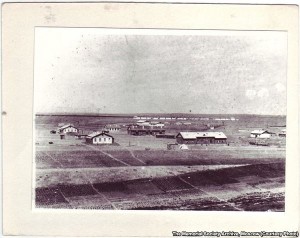The story of David Klassen, a Mennonite Brethren church leader in the USSR who was imprisoned three separate times between 1936 and 1965, is an inspiring account of faithfulness in the face of overwhelming opposition. At the conclusion of Klassen’s narrative, I was left wondering how he and other Mennonite Brethren who ended up in Karaganda sustained their faith in such difficult, and seemingly interminable, circumstances.
The Profiles of Mennonite Faith series, a project of the Mennonite Brethren Historical Commission, profiled David Klassen in 2011. The narrative recounts Klassen’s final imprisonment in 1962 and provides examples of the kinds of spiritual practices that Klassen maintained, even in difficult circumstances.

In 1962, three leaders of the Karaganda Mennonite Brethren—Heinrich Zorn, Heinrich Wiebe, and elder David Klassen—were arrested and tried. Although they were imprisoned in separate sections of the prison, sound carried easily from one section to another.
Heinrich Wiebe…recognized Klassen’s presence in prison when he heard him singing (in German), “My contentment rests in my readiness to accept what I cannot change.” Wiebe sang in reply, “We shall meet on that beautiful shore.”
Wiebe and Klassen used the hymns of their church for comforting each other and communicating across cell walls.
When it came time for their trial, all three men were warned not to speak to one another in the courtroom. As Klassen entered the courtroom, however, “he greeted his ‘brothers’ heartily. ‘How can I be quiet when they are my brothers?’ he told an official who tried to silence him.” When it came time for sentencing, Klassen received the harshest sentence.
In addition to singing hymns, the men publicly affirmed their communion with each other as fellow believers, an act that marked them as separate and implied that their ultimate loyalty lay beyond the state.
A final anecdote from the Profiles of Faith narrative adds further insight:
Upon being brought to a cell with about 40 prisoners, Klassen told Wiebe they would immediately distribute the supplies they had brought from home. That broke any barriers they might have had with the others. That evening, as they were about to try to sleep, Klassen said he would have an “evening blessing” as usual. He recited some verses of Scripture and 12 verses of the song, “Commit your way to the Lord.” The entire cell fell silent as the two knelt to pray. They had won their cellmates’ respect.
Although sharing their supplies with all the other prisoners in their cell was likely primarily a practical decision, it also reflected a religious commitment to sharing goods and material wealth.
Again, the men sang, this time in the same cell. And when they prayed, they didn’t try to hide it from the 40 other prisoners sharing their cell, but instead did so with an open and honest posture that drew the attention of their cellmates.
These anecdotes certainly cannot provide us with a full picture of the spiritual practices that sustained these men and others in the Karaganda community through decades of persecution and hardship, but they do offer a glimpse of their inner personal and communal spiritual lives. At least for some, Scripture, hymns, community, and prayer were vital practices for sustaining Mennonite Brethren faith practice in the context of Soviet Karaganda.